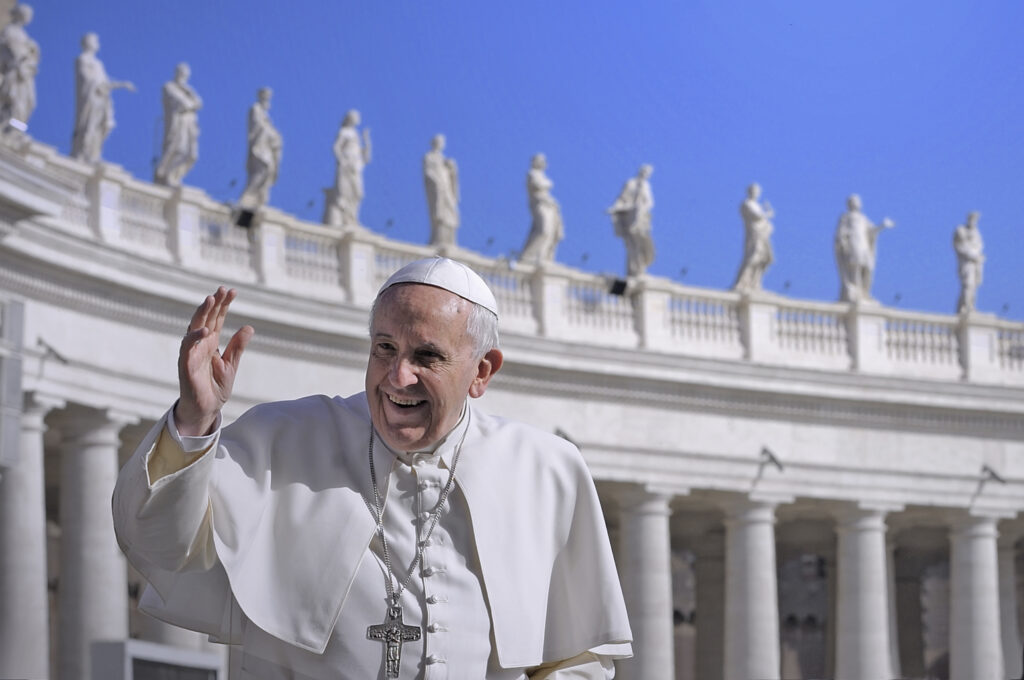
by Todd Habiger
todd.habiger@theleaven.org
KANSAS CITY, Kan. — To say Pope Francis was a man of the people would be an understatement.
From his days of riding the bus to work in Argentina to dining with the poor at the Vatican, Pope Francis was different.
His personal, pastoral style was noted by many in the archdiocese who praised the pope for his hands-on approach.
On the peripheries
“He was a man of deep compassion for those on the peripheries, those that were hurting, those that seem to be excluded in some form from society,” said Archbishop Joseph F. Naumann.
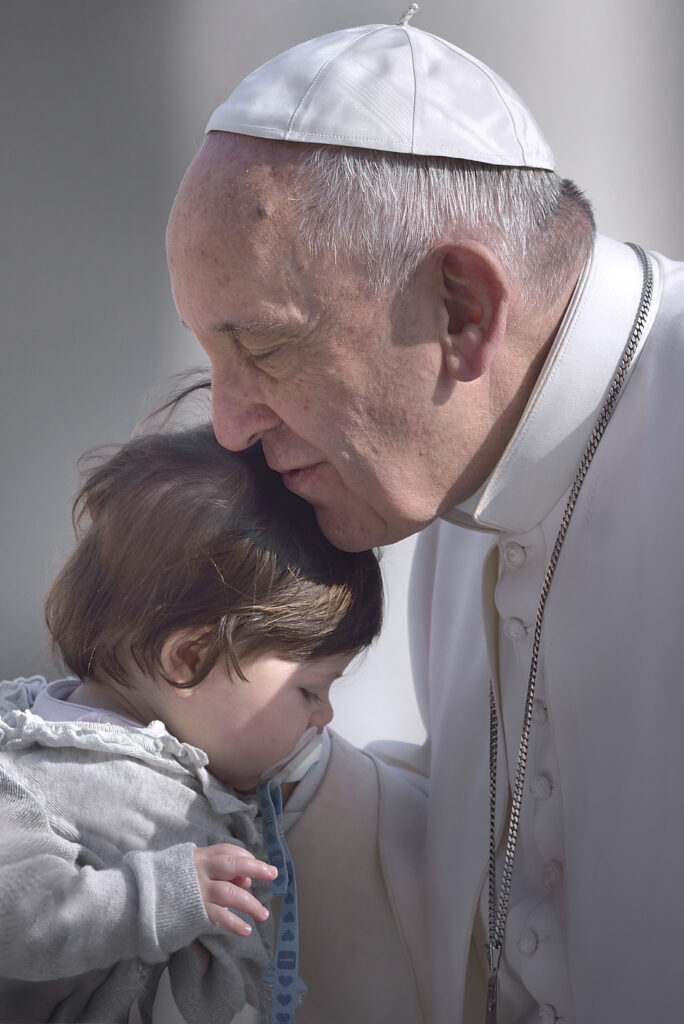
Pope Francis was a champion of the poor, the imprisoned, the refugees, the immigrants and all who were considered outcasts or lesser.
“He was always urging the church not to be inward-looking and self-absorbed, but to be taking the Gospel to every corner of the Earth,” the archbishop said.
Pope Francis’ unique, and often unconventional, style also worked its way into his writings. Archbishop Naumann said that his favorite encyclical of the late pope’s was his first, “Evangelii Gaudium” “(The Joy of the Gospel”).
“Somewhere in there — at least in the translation — he uses the word ‘sourpuss,’ which I don’t think was ever used in a papal document before,” he said with a chuckle.
“He talks about how we should reflect the joy that comes from having encountered Jesus in our lives and not be overridden with anxiety,” he added.
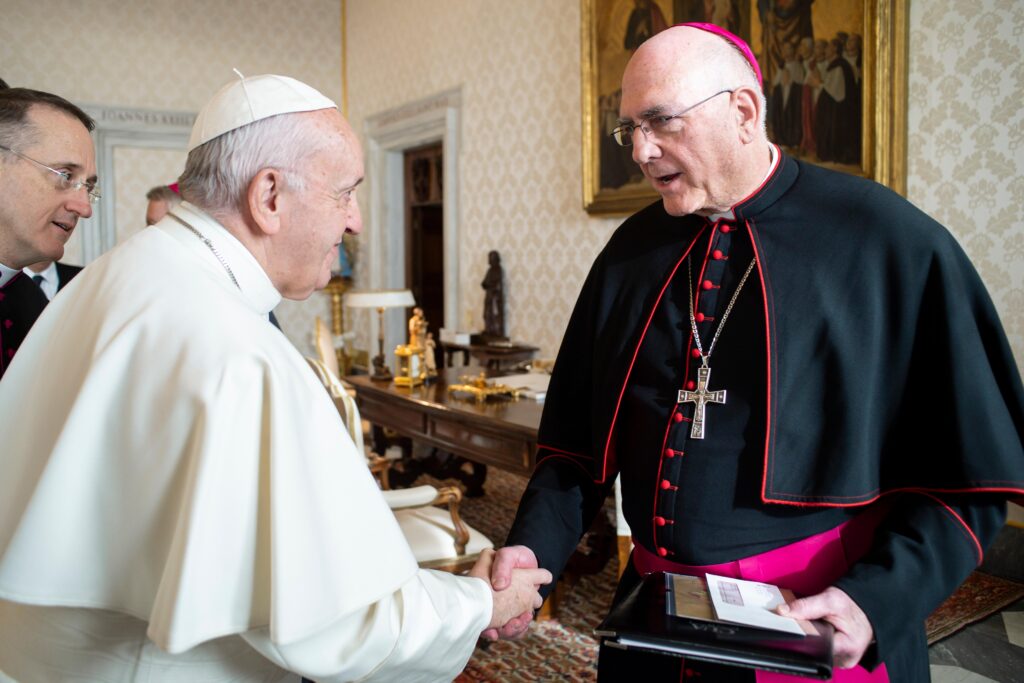
Archbishop Naumann appreciated Pope Francis’ leadership and his willingness to have a constructive dialogue with those he worked with. He recounted meeting the pope in 2020 for an “ad limina” visit and he recalled the pope being adamant about having honest conversations.
Keeping it simple
“He said that the only way that the visit was going to be meaningful was if we were honest with him. [He] told us to ask any question and make any criticism we wanted. I thought he modeled really good leadership there,” Archbishop Naumann said.

Archbishop-designate Shawn McKnight learned about the pope’s death in the early morning hours of April 21.
“It came across the Catholic News Service Twitter feed and I thought it was a mistake or some sort of fake-news-type thing, and so I had a hard time accepting the reality of it,” he said.
Soon, he would learn that the man that first made him a bishop in 2017, and promoted him to archbishop just a few weeks ago, had indeed died.
Archbishop-designate McKnight first met Pope Francis in 2020 and was immediately impressed.
“He was very hospitable, very kind and very concerned about our needs when we gathered as bishops of Region 9 for the ‘ad limina’ visit in January 2020,” said the archbishop-designate. “He was particularly concerned about everyone knowing where the restroom was and that they were free to go and get something to drink during our long conversations. He’s very solicitous of people’s personal and individual needs.”
Archbishop-designate McKnight said that Pope Francis had a special way of connecting with people on their level and meeting them where they were.
“He had the ability to take ordinary, simple gestures, and make the most of them and to be very expressive of our faith and the Gospel reality,” he said. “It’s not something that’s just ephemeral but concrete. Not just thinking about the faith and our content of what we believe, but actually living it out one-on-one with people.”
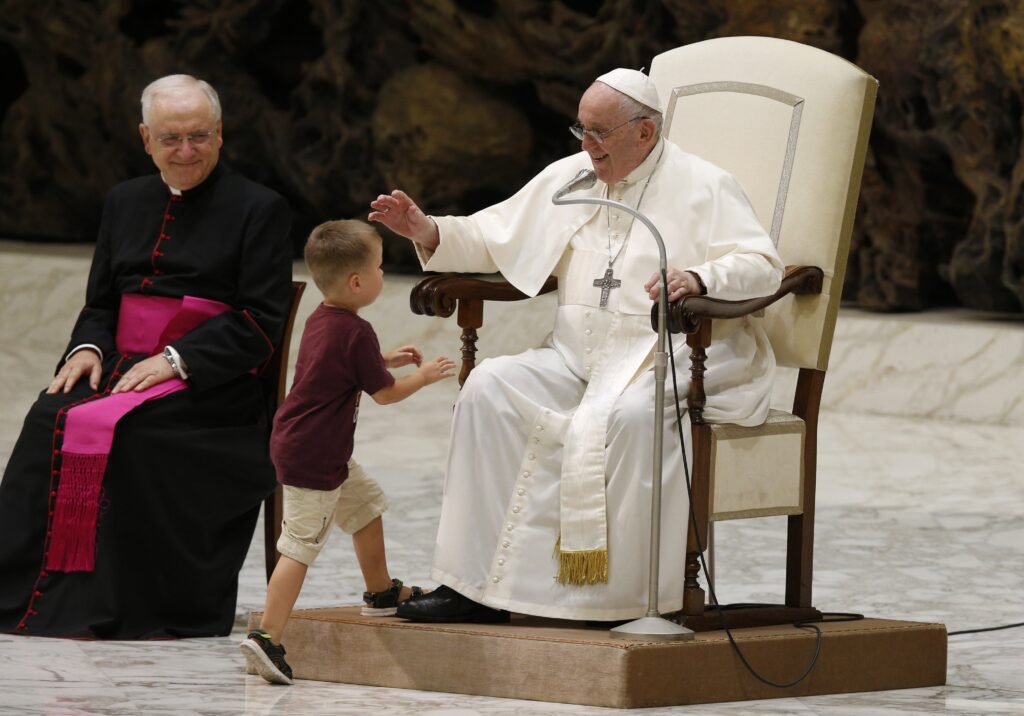
Pope Francis was a pope who spoke his mind and challenged people to come together in a time when the seeds of hatred and conflict were being planted.
“At a time in history marked by growing division, Pope Francis showed us how we can seek to sow unity — by simply speaking with one another and listening with an open heart. He reminded us that the Holy Spirit works through all of us. We simply have to ask for the courage to speak and the patience to listen,” Archbishop-designate McKnight said in a prepared statement.
Everyone’s pope
Father Michael Hawken, pastor of Church of the Nativity in Leawood, said that Pope Francis was a person that everyone could relate to.
“‘Gospel through example’ is how I would characterize him,” Father Hawken said. “People saw him as so approachable and felt that he would listen to them and that he could relate to them. Do you know how many times I’ve heard people who were non-Catholics tell me, ‘You know I’m not a Catholic, but I sure like your pope.’”
The ability of Pope Francis to connect with people on a personal level left an impression on Father Hawken.
“He told priests that they have ‘got to smell like the sheep.’ He said pastors need to live and laugh and cry with their people,” Father Hawken said.
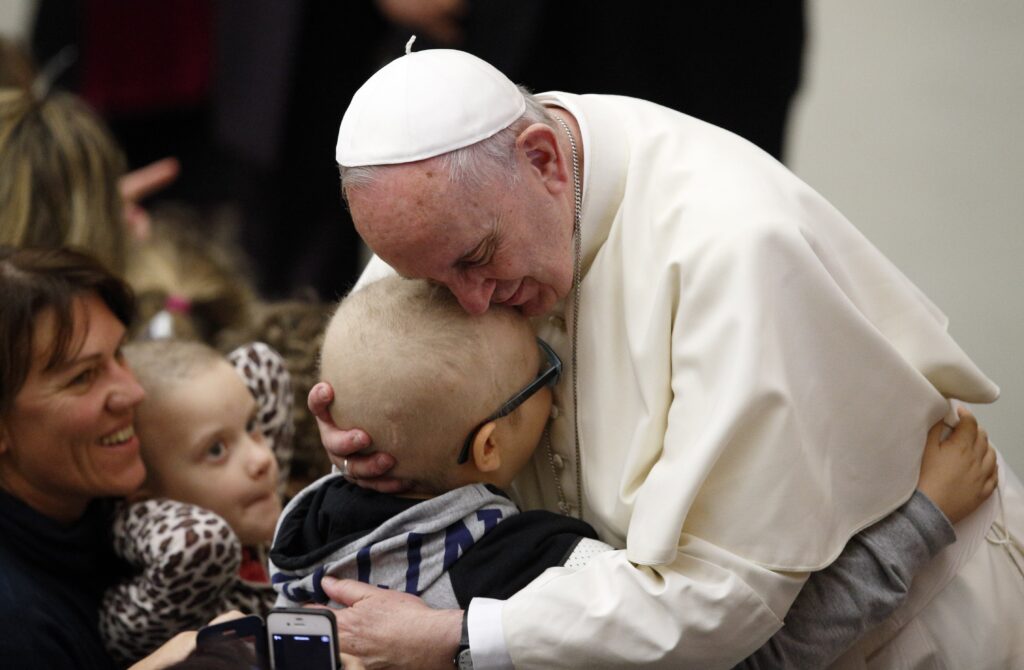
Father Hawken said that Pope Francis’ vision for the church was a powerful one, but one that was not just his but a shared vision with the faithful.
“I loved his vision for a synodal church because it was such an affirmation that the Holy Spirit is present in all the baptized. I loved that he was not afraid to have a conversation and listen to the concerns and joys and hardships of the people,” he said.
‘Art of accompaniment’
Father Francis Hund, archdiocesan minister to priests, is a big fan of Pope Francis’ writings. As Father Hund recovers from knee replacement surgery, he’s been reading many of the pope’s works.
There is a passage from “The Joy of the Gospel” that really stands out to him.
“There is a great line that I love,” he said. “He called it the ‘art of accompaniment,’ about how we are called to be people who walk and journey with one another on the path of life.”
Pope Francis lived what he preached, said Father Hund.
“His ministry, his outreach, was to the migrants, the poorest of the poor, the people dealing with war, and those struggling with hatred,” said Father Hund. “He was always in the peripheries, going to accompany those most in need.”
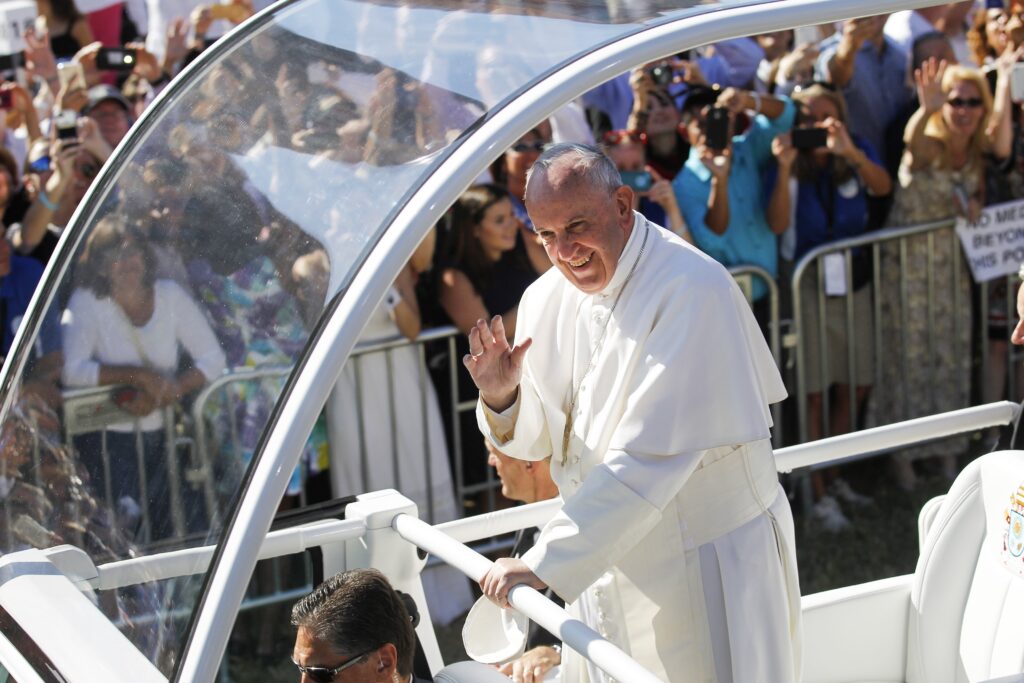
Father Jerry Arano-Ponce, pastor of Queen of the Holy Rosary Parish in Bucyrus, graduated from Gonzaga University in Spokane, Washington, a Jesuit college. The Jesuits just happen to be the religious order that Pope Francis belonged to.
“I understood Pope Francis’ Jesuit roots as he truly sought God in all things and he was a man for others in the Ignatian tradition,” Father Arano-Ponce said.
“Pope Francis reawakened a fresh look in the corporal works of mercy, as he cared for the sick, visited the imprisoned and welcomed the poor and immigrants, and spoke about social justice issues,” Father Arano-Ponce said.
Father Arano-Ponce has a deep appreciation for Pope Francis’ recognition of the laity during his pontificate and the pope’s willingness to break through the glass ceiling.
“He elevated St. Mary Madgalene to the dignity of ‘Apostle to the Apostles’ and acknowledged women as the backbone of the church and entrusted women with positions of church authority,” he said.
A strong legacy
Archbishop-designate McKnight is a bishop of Pope Francis and looked toward him for inspiration and direction.
“He is the one who provides the pastoral vision for our universal church and I’ve been doing my best as bishop to implement it. His encyclical ‘The Joy of the Gospel’ was his blueprint, and I tried to follow that faithfully,” he said.
Archbishop-designate McKnight appreciates the leadership Pope Francis provided during difficult times and his efforts to bring his followers closer to God.
“The teaching of Pope Francis often challenged us to avoid the modern temptation to retreat into isolation and comfort,” he said. “Rather, we are called to be present in the world, embracing the unpredictable, the unscripted — the very moments where God speaks most profoundly.
“He showed that our beliefs are not walls that enclose us from the world; they are a foundation that gives us strong footing as we step out, searching for the light of Christ in everyone we encounter.”






